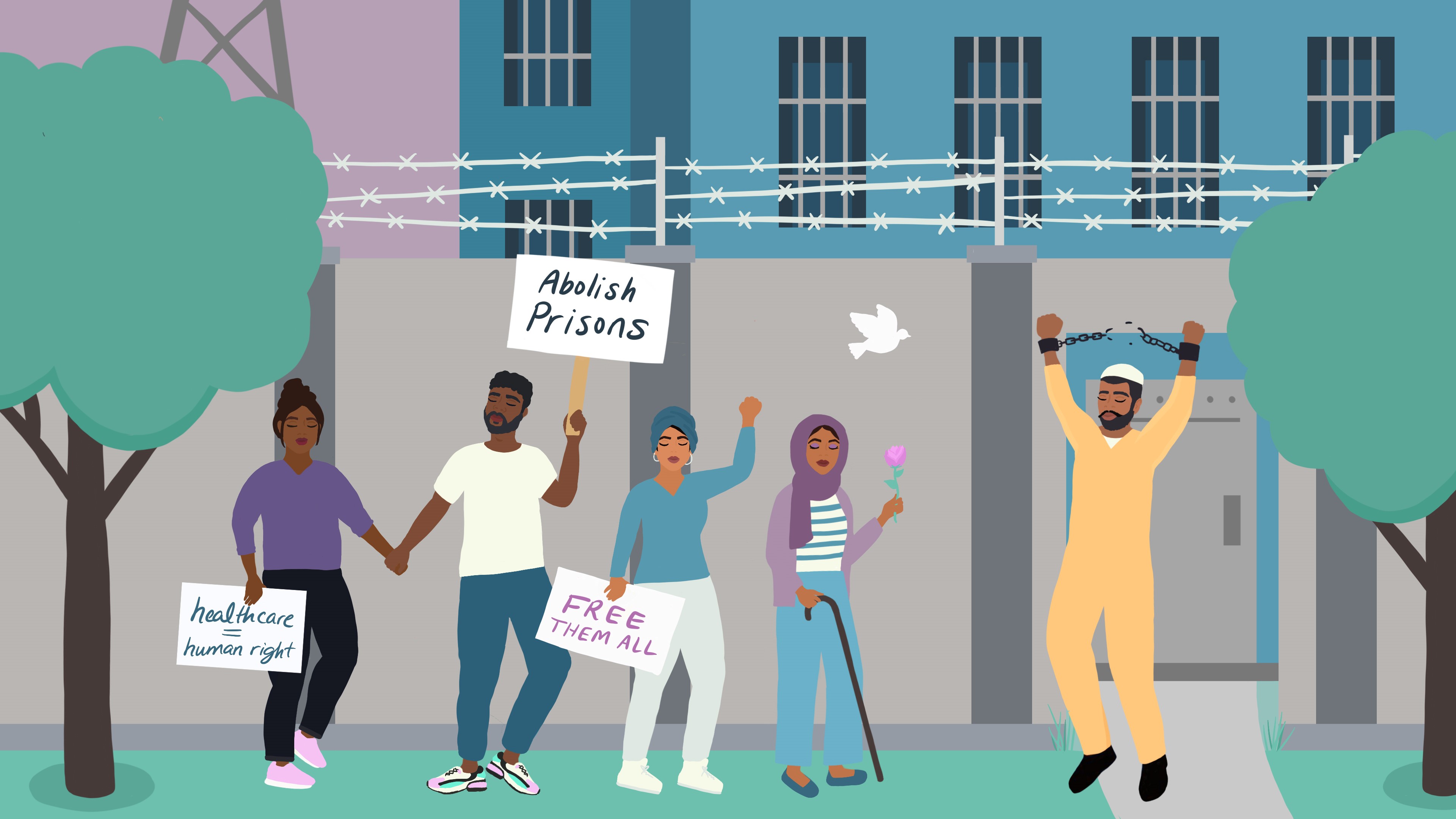
Still from Reimagining Communities, Artist: Shirien Damra Carlos Sebastián / Nómada
No one is served by locking up millions of people behind bars. But right now, more than 2.3 million people are incarcerated—a disproportionate number of whom are Black and Latinx.
Nearly a quarter of people incarcerated are being held on pretrial bond, meaning they have not been convicted of a crime. They simply cannot afford to pay bail to secure their release. People can be jailed indefinitely, placing them at risk of losing their jobs, their children, and homes. Those held on bond in Immigration and Customs Enforcement (ICE) detention centers face similar burdens. And reports have shown that people detained before trial have worse outcomes than those who are not.
This Ramadan presents an opportunity for all people to stand with Muslims and learn more about Muslim-led initiatives that are addressing injustices, which have been magnified by the COVID-19 pandemic.
As communities across the U.S. are working to free people from prisons, jails, and detention centers, we talked with Believers Bail Out (BBO), which works to bail out Muslims in pretrial incarceration and ICE custody. BBO is a community-led project addressing these issues as a “faith-based community idea—Muslims who want to help Muslims who are being held in pre-trial detention,” says Kifah Shah, of MPower Change, a partner organization of BBO. “It resonated for a lot of people that this is an unjust process.”
BBO, which is run by volunteers, is based upon the notion that “the Qur’an calls on Muslims to call out oppression and act to remedy it. Muslims being held on bail they cannot afford by a system that systematically discriminates based on race can be freed with zakat, an annual tax on wealth, that is one of the central tenants of Islam.” Since BBO’s founding in 2018, zakat donations to BBO have made it possible to free 38 Muslims from pretrial and immigration incarceration and provided them with assistance after their release.
BBO focuses on three main areas of concern: the prison industrial complex, anti-Muslim racism, and anti-Blackness.
Islam effectively challenges the social order based on inequality and racism, says Kiran Nizamani, a Chicago-based volunteer with BBO. “There is a lot of power in Islam when it comes to supporting those who are oppressed, and specific writings in the Qur’an about supporting those who are imprisoned or kept as captives. Many of the enslaved people who were brought to the U.S. were Muslims, and their religion was stolen from them.”
In prisons and jails, Muslims face restrictions and impediments on access to religious attire, prayer rugs, the Qur’an, and religiously appropriate diets—all while some people are in pre-trial incarceration for years, says Kiran. “Once, when visiting a Muslim person in a maximum-security prison, the level of security was so much higher than other units I’d visited. It was a familiar experience but in a different environment, reminding me of my experiences in airports, with the extra scrutiny and militarization because I wear a hijab.”
As COVID-19 runs rampant in carceral facilities around the U.S., there is even more urgency to get people out of prisons, jails, and detention. “Many incarcerated people are within high risk groups, and there is no way for them to be safe,” says Kifah. “I had the virus, and from a very human level it is such a lonely experience—I cannot imagine what a lonely experience it is for someone locked up.”
How can allies stand with Muslims working to end mass incarceration in this pandemic and beyond? Allies can educate themselves and help raise awareness, Kiran says, “allowing others to reimagine our society without prisons and jails because they don’t serve us at all.”
Here are some resources to learn more:
- Believers Bail Out: Learn more about the injustices of money bail and how communities are working to end it.
- "Leaving no others behind this Ramadan: A bail fund to help free detained Muslims finds new urgency as COVID-19 spreads rapidly through prisons and jails," by Vanessa Taylor (New Republic)
- Videos: BBO National Day of Action: Watch talks and discussions featuring Muslim scholars, activists, community organizers, and performers from around the country discussing how their faith informs their work to reimagine community and build a world that is healthy, safe, and just for all.
- “Those Who Know Don't Say: The Nation of Islam, the Black Freedom Movement, and the Carceral State” by Garrett Felber